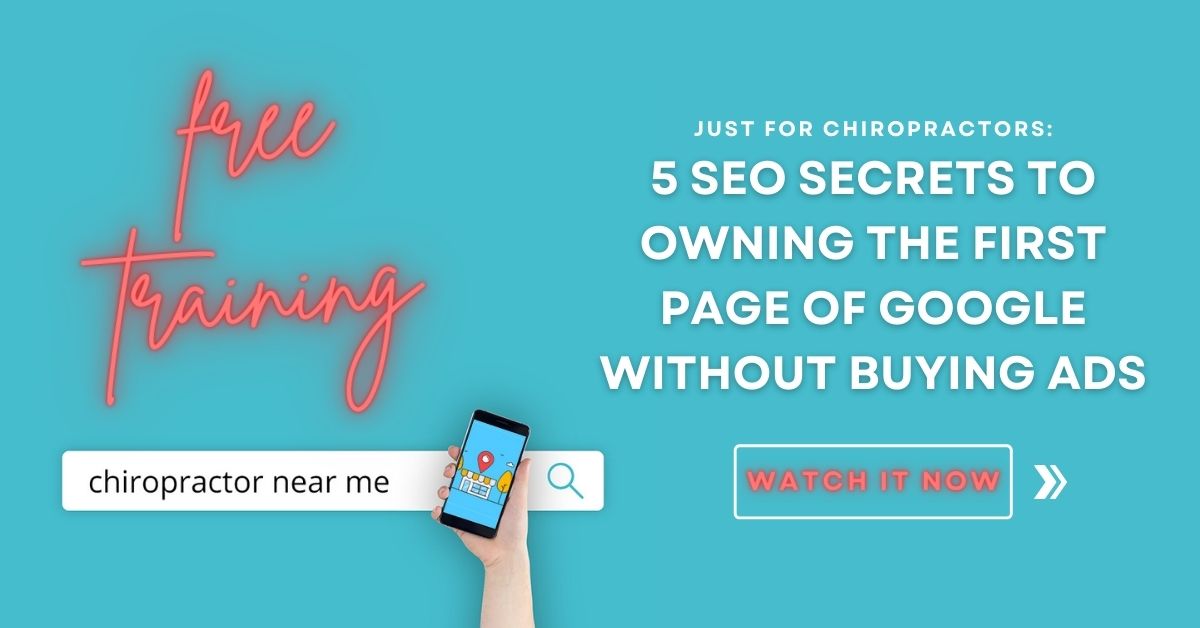Creating your first website can be overwhelming; between design, copy, pages to include, images, and all the technical stuff, you may want to give up. Your website represents you and what you do. It’s often the first way a potential patient or buyer sees you.
Setting up your website right the first time will save you loads of time, money, and energy.
Learn all the tips and tricks to make website building go easy.
We’re going over the following:
- Smart steps to set up your website
- Why you need Google Analytics
- Resources that make website building easier
- What content should be on your website
- And much more
If you’re a clinic owner preparing to create a website (or even if you think your existing website needs some attention), this podcast will highlight what you need to do.
Don’t let your users stray! Give them an excellent website so they know you’re the one they should choose to meet their needs.
Listen to the audio version:
Watch the video version:
Show Notes:
What are other ways I can increase my online presence? Check out our free masterclass Five SEO Secrets to Owning the First Page of Google Without Buying Ads.
Want to suggest a topic or guest? Please do so! I’m up for a challenge! Suggest a topic for an upcoming episode of the Propel Your Practice Podcast
Selected links and other resources related to this episode:
- Propel Marketing & Design
- Propel Your Practice Podcast
- Fiverr
- Upwork
- WordPress
- WP Engine
- Squarespace
- Wix
- Clinic Sites
- Google Analytics
- Grammarly
- What to put on my homepage
- Propel’s resources to help build your website and its content
- https://depositphotos.com/ for stock photos
- How to Plan Picture-Perfect Photoshoot
- Suggest a topic for an upcoming episode of the Propel Your Practice Podcast
- Free training: Five SEO Secrets to Owning the First Page of Google Without Buying Ads
- Propel Your Practice YouTube Channel
If you're putting together your clinic's website for the first time, this episode is for you.
Hello and welcome to the Propel Your Practice Podcast, where we discuss actionable strategies you can put in place to help propel your clinic's presence online. I'm your host Darcy Sullivan with Propel Marketing & Design.
This is the first podcast for 2023, and we're full of a couple firsts.
First, I'm coming off of my first experience having COVID. So, I do apologize if I still sound a little bit congested. But I figured a great way to start off the first episode of this year would be to talk about what it's like to set up a website for the first time.
Now, if you already have a website and you're planning a website redesign, I think you will still find value in this episode; we will be filming a specific episode coming up soon that purely dives into what it's like and what you should consider for a website redesign.
But in today's episode, I'm going to be sharing with you the process for setting up a website for the first time. And I'll be sharing with you some tips so that you can set it up with ease, along with discussing a few items you should spend your money on when you're setting up your website for the first time and where you can pull back the budget in areas that you can save when you're setting up a website for the first time.
And it all starts with the URL. That's what you type into Google to go to your website. You want to make sure that if you're picking out a URL for the first time that it's short and sweet but also matches the name of your business or is close to representing the name of your business so that when you tell people to go to your website, www.nameofwebsite.com, it's very easy for them to find it.
That you haven't been too creative when it comes to the lettering. Or gone too off the rails in the link of the URL- that you keep it simple and sweet. So, it's easy for them just to simply type it in and for your website to come up.
Once you've figured out what URL you want to use for your website, the next thing you want to do is decide on a platform and hosting.
These days, there are so many website platforms out there that make it easier than ever for people that are just getting started to put together a website. Now, if you're putting together a website for the first time, you might be short on budget and decide that you're going to do your DIY version of a website.
Or you might want to hire some help. You can go all the way up to hiring an SEO company or a professional website company to put together your first website. Or you could look to Fiverr or Upwork for assistance.
Or you might want to go the DIY route. If you decide to go the DIY route, there are some platforms that are easier for you to set up than those that require a little bit more assistance and a little bit more tech know-how.
Out of all of the website platforms, I tend to recommend and love WordPress. WordPress can be a little bit difficult for those that aren't that tech-savvy. So, if you are looking to design a WordPress website, you might want to consider getting a little help if you're a tech novice.
Now, when it comes to WordPress, that's the foundation. That would be the platform that you're using. But you also need hosting when it comes to a WordPress website.
Hosting is where your files actually set. And for that, I suggest WP Engine. In the notes section associated with this podcast, you'll be able to find links to all of the items that we're going to reference here.
Now, if you're going the DIY route and you don't fancy yourself a techie person, you
You might want to consider either Squarespace, Wix, or Clinic Sites. All of these platforms offer easy-to-use templates and the ability to set things up easily if you're really not that tech-savvy.
Now, I mentioned before that WordPress is generally the platform that I would suggest that you go with if you do have a little bit of tech assistance.
When it comes to WordPress, there are tons of themes, and leveraging prebuilt themes will give you the ability to cut some of the overhead off because you're not starting directly from scratch- you're starting with a theme.
Now Wix and Squarespace also include themes that you can check out. And that's what gives the site that overall structure and design.
Once you've decided which platform you want to go with, next, you're going to want to start to pull together the content that you need for your website. You can think of these as the ingredients for your recipe. It's a lot easier to gather everything together before you start to bake. Right?
So you want to pull together text and visuals. These could be your logo. Real photos, stock photos, illustrations, testimonials, videos, your social media links. And you're going to want to also include tracking. Such as Google Analytics.
I highly recommend as soon as you kickstart your website, you go through the process of adding Google Analytics.
Google Analytics is going to track the data of how people came to your site, what they're doing on your website; it's going to give you information that's going to help guide you with the content that you're going to want to modify on your website and continue to add to your website to grow your audience larger.
We talked for a minute about what content you need, what elements, what ingredients for your recipe that you want to gather. And I want to kind of go back through those, and we'll go through them one by one.
Um, starting with your logo. Now your logo is a place where if you're just getting started, you can save a little money.
You can go to Fiverr, or you can go to Upwork to have a logo designed. And right now, there are tons of resources out there that will help you design a professional-looking logo at a very low rate. What you want to make sure of when you're having a logo designed is that it's really easy for someone to understand what the name of the company is when they read the logo.
So you don't want to get too creative or too crazy with fonts that it makes it hard to read or understand what the logo is trying to say.
As you go to gather your ingredients for the recipe that we'll call it your website, you want to go out and look at what your competition is doing, but please be sure not to just directly copy exactly what they're doing.
So you can go out and take a look. But don't copy word for word what they're doing.
Now, when it comes to the content that you need on your website, you're gonna want to put together a bit of text. What I suggest for this is that you kind of open up a Google Doc, and you start to write and organize your content on there before you actually load it to your website.
If you've listened to this podcast before, maybe one of the blogging episodes, one of my favorite tools that I've mentioned on that episode and a lot of other episodes is Grammarly. And Grammarly will help you make sure that you are using proper grammar and spelling, which we all know is very important on your website.
Since your website is not a digital brochure- your website is way more than that- there are a couple key pages that you want to make sure that you include when you're putting together your website for the first time.
This includes the homepage. On your homepage, you want to make sure that it's very crystal clear what you offer. That if you offer more than one service, it's highlighted on the homepage.
You want to make sure that the conditions that you treat are highlighted on the homepage, that it's very easy for somebody to book an appointment with you, and that you have testimonials. This will give proof to new website visitors that you have treated people for exactly what they're suffering from.
You want to include a services page, a conditions page, a contact page, a privacy policy or terms of use page, an about page, and a book an appointment page.
And then, as you continue to grow out your website, you might also want to later include a resources page that has information about first visits, paperwork; you might want to include a video library. Later on, you might want to start blogging.
So, if you just open up that Google Doc that we talked about before, you can start to kind of just bullet point out the pages that you need, your homepage, services, conditions, privacy policy, contact, about. and any other resources, and then start to add the content that you want to include on your website in the Google Doc, so you can see where you’re missing element and what needs to be built out.
We have a really great resource, which is the Five SEO Secrets to Owning the First Page of Google Without Buying Ads, which is a free training that I put together. You can visit propelyourcompany.com/learn to sign up for that.
Darcy’s SEO strategies are easy to implement and effective. She’s the #1 SEO expert I refer to whenever I need help with my rankings.
SEO queen! I can’t thank Propel and Darcy enough for holding my hand through the SEO process! I’m loving the podcast and all the insight! Also loving that my business is now getting the brand awareness and sales I’ve always wanted!
Wow! Clear, concise and impactful. Excellent details and tips - already seeing a return!! Worth the 20 min listen.
Get our next podcast episode delivered directly to your inbox:
We'll email you when we release new episodes.
Sponsors
This episode of the Propel Your Practice Podcast is brought to you by Propel Marketing & Design. Propel Marketing & Design helps Chiropractors, Acupuncturists, Physical Therapists, Wellness Practitioners, and other clinic owners improve their website rankings.
Do you have a suggestion for an upcoming topic or guest?
We love a good suggestion and we’re happy to take yours! Tell us about a topic you want to hear more about or a guest you think would make an impact here and we’ll take care of the rest.
Interested in sponsoring a Propel Your Practice Podcast episode?
If your organization would be a good fit for our target audience, we’d love to work with you. Hit the link below and let’s talk.










![How to Write a Professional Chiropractic Bio [Template Included]](https://propelyourcompany.com/wp-content/uploads/write-a-bio-500x383.jpg)

